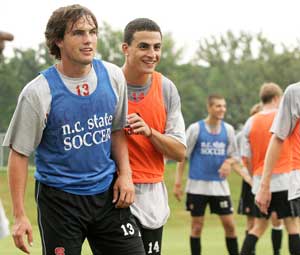When preseason practice started in August, there were two noticeable absences from the men’s soccer team — seniors Rami Ghanayem and Kevin Averette were not there. And it was not due to injury or anything of an athletic nature. It was due to academics.
Ghanayem and Averette were studying for the MCAT exam for entrance to medical school — a process Ghanayem said began in early June and ended with the test on August 19.
“The MCAT is definitely a challenging exam,” he said. “I signed up for the Kaplan review course, which is a June, July, midway-through-August intensive review course.”
Ghanayem added, though, it was not enough time to properly prepare for such a tough test.
“Two and a half months wasn’t enough. I say you should give it six months. You should do five hours a week for six months, and you’ll be fine on the exam,” Ghanayem said. “It’s a test you can’t cram for. A month and a half is cramming.”
Averette echoed Ghanayem’s comments on the difficulty of the exam.
“I felt like I knew what was going to be on the exam,” he said. “But the material is very difficult. It’s basically your four years summed up in one test.”
The following week both players rejoined the team. But missing the first week of practice their senior year was something Ghanayem and Averette said was hard.
“It was a pretty big blow for me and for the guys,” Ghanayem said. “I’m supposed to be the senior. I’m supposed to be the first one there in preseason and the last to leave in preseason. And for me to miss it seemed like it would be such a huge emotional blow for the team.”
Averette said he struggled with the decision as well.
“It was real tough,” he said. “It was [a] tough decision, but we knew we had to be in the books for that period [of time].”
However, when they returned, it was as if they had not missed a day, according to Ghanayem.
“Me and Kevin’s first day of practice, it was like nothing even happened,” he said. “Everyone supported us. It was like any other day [of] practice. That was huge for us to have the moral support of the team.”
Averette said he felt like he had to catch up with the rest of team.
“[Missing] a week of practice puts you behind so much,” he said. “Especially in preseason. So getting back in the swing of things was real hard.”
Coach George Tarantini said missing practice for the MCAT exam showed what kind of leadership roles they have on the team.
“They are inspirations,” Tarantini said. “That’s what being a student-athlete is all about.”
The impact of Averette and Ghanayem’s commitment in the classroom is not lost on the players either. Freshman defender Orry Powers said Averette and Ghanayem are positive influences on the younger players.
“It’s a big influence to the rest of us,” Powers said. “They push us on and off the field … they’ve really helped us out.”
After college, both players say they plan to pursue medicine as a career, but that is where the similarities end.
Averette, who plans to become an orthopedic surgeon, said he knew in high school he wanted to become a doctor.
“I had orthopedic knee surgery in my junior year of high school,” Averette said. “And that kind of sparked my interest. It was a way to stay around sports and have a profession.”
Ghanayem, on the other hand, has taken a more roundabout route in choosing a career. When he came to college, he was actually an engineering major.
And it was not until his junior year that he changed his mind.
“I went two years in biomedical engineering before deciding on medicine,” Ghanayem said. “Then I really wanted to be focused on medicine and I wanted to be gung-ho about it after my second year.”
But he said he’s not sure what type of doctor he wants to be.
“I don’t know,” Ghanayem said. “I’m going into it with an open mind. I know I want to be a doctor and I want to help people in some form or fashion.”
For Averette, the only decision left is which medical school to attend.
“I would like to stay in North Carolina,” he said. “Unfortunately, that means I might have to go down the road to Chapel Hill. But I would definitely consider it. My No. 1 preference would be East Carolina because I could still stay in the state. It would be a little bit cheaper.”








